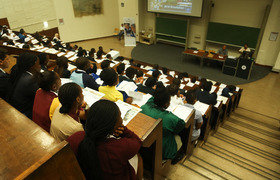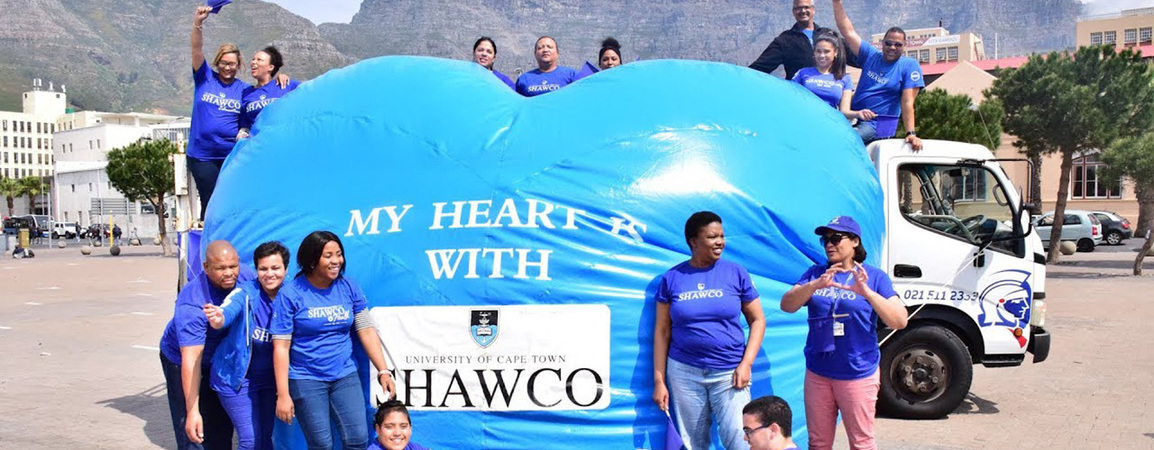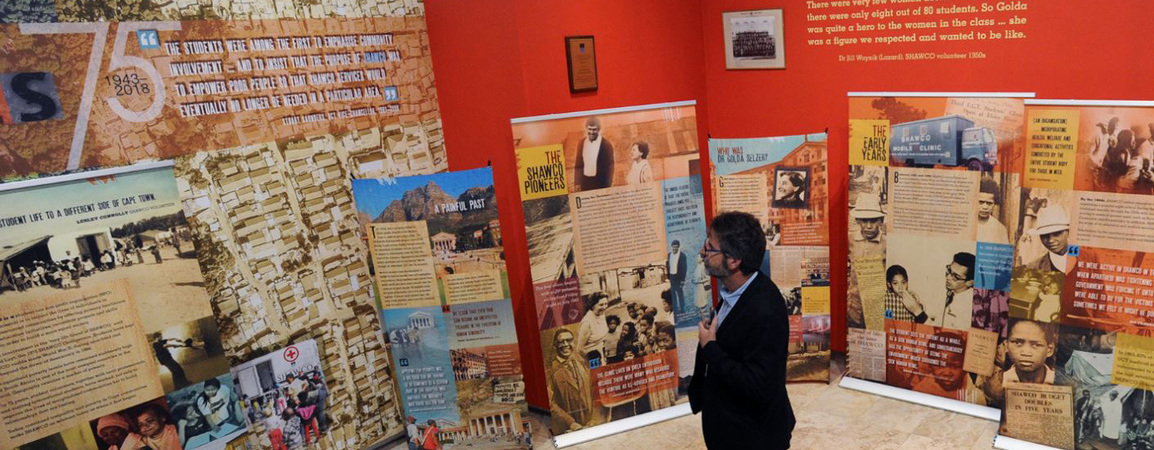Graduates must become ‘more African‘
14 December 2018 | Story Carla Bernardo. Photos Michael Hammond. Read time 5 min.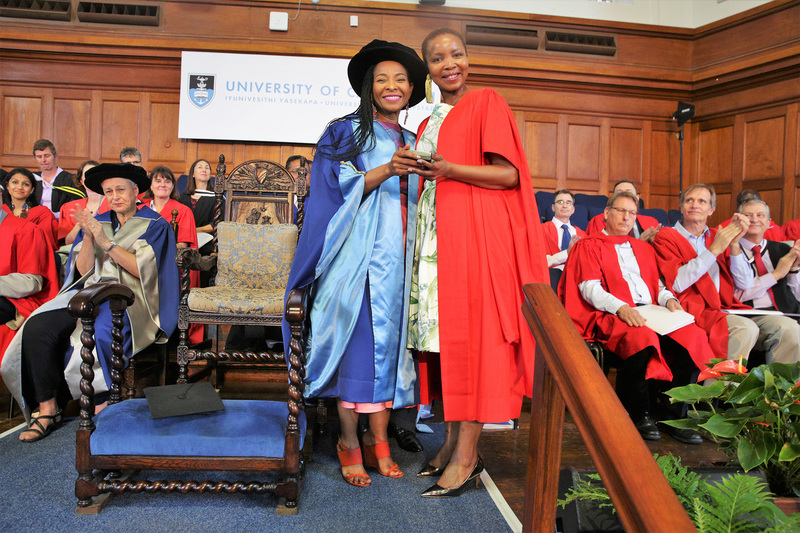
The University of Cape Town’s (UCT) Faculty of Commerce graduation on Friday, 14 December, was a space for the celebration and cementing of what it means to be African, in the context of oppression and in a world of unprecedented change.
The official ceremony began when lauded academic, author, activist and UCT alumnus Professor Pumla Dineo Gqola received the President of Convocation Medal. The medal is awarded annually to a past student who has made a significant contribution to society.
Lorna Houston, the President of Convocation, detailed Gqola’s many contributions to African literature, among those her critically acclaimed Rape: A South African Nightmare.
She said it was just one of the ways in which Gqola, whose approach was “interdisciplinary … transformative and healing”, had addressed the oppressive systems that have tormented black people, specifically black women.
The consequences of oppressive systems such as apartheid were also addressed. Acting Deputy Vice-Chancellor (DVC) for Research and Internationalisation in the Faculty of Commerce, Professor Michael Kyobe, spoke of UCT’s complicity in denying many past students and staff “full and dignified” participation in the life of the university.
For many who defied the apartheid regime, because of the colour of their skin or because of their political ideology or sympathies – such as Raymond Suttner, graduation was not an option, he pointed out.
“Bring the full length and depth of your Africanness to the global stage.”
As part of righting this wrong, UCT Council and Senate invited past students to attend “re-graduations”. One of these “restorative rituals” took place during the Faculty of Commerce’s ceremony when Erik George Eduard Jacques Vicher received his Bachelor of Commerce degree.
He was among UCT students between 1950 and 1993 who chose not to graduate, or to participate in a graduation ceremony, to protest the university’s lack of acknowledgement of the injustices of apartheid and the effect on other UCT staff and students.
With the past acknowledged and present celebrated, it fell to keynote speaker for the graduation ceremony, Mamello Selamolela, to prepare graduands for the future.
A lifetime of learning
Selamolela, a UCT alumnus, managing executive for Vodacom’s central region and an expert in the telecommunications industry, shared with graduands her projections for work in the Fourth Industrial Revolution and what it meant to be African in a future world.
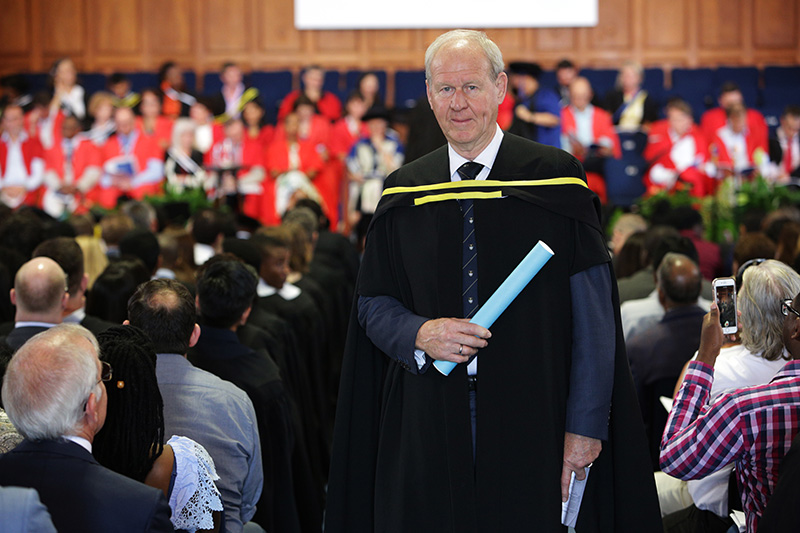
Graduation, she said, was a culmination and reward for years of hard work, persistence and sacrifice under the glare of unrelenting pressure and expectation. And in a rapidly changing and uncertain world, Selamolela put to graduands that now is the time to seize the opportunities in order to meet the obligations that await them.
She appealed to them to view graduation not as the end of one chapter and the beginning of another, but rather as an exercise setting them up for life.
“Your degree or diploma is the foundation that sets you up for a lifetime of learning … creativity, leadership, the ability to cope with ambiguity ... and the vital skill of getting things done.”
But, said Selamolela, even with their degrees and diplomas, graduands would have to prepare themselves for a world in which many of the jobs for which they are qualifying will no longer exist.
The questions facing them include how they will prepare themselves for a world where technology’s pervasiveness in society continues to escalate, and where the repetitive parts of existing jobs will certainly be replaced by robots.
“How do we tackle problems we cannot yet imagine? How will we reshape society? How do we prepare our young people for the new world,” asked Selamolela.
“These are the very real questions we as a global society have to tackle.”
Celebrating Africanness
As university graduates, it would their responsibility to help influence and shape the future world.
The skills and traits she listed as critical for the future world included critical thinking, problem-solving, empathy, humour and love.
Above all, the key to the graduands’ future success, said Selamolela, will be the celebration of their Africanness.
“I implore you to bring your full length and depth of your Africanness to the global stage.”
This defining feature must be “audible and palpable in the boardrooms of the world”.
“As we become more global, we have to become more African, not less,” she said.
 This work is licensed under a Creative Commons Attribution-NoDerivatives 4.0 International License.
This work is licensed under a Creative Commons Attribution-NoDerivatives 4.0 International License.
Please view the republishing articles page for more information.
Students’ Health and Welfare Centres Organisation (SHAWCO)
The Students' Health and Welfare Centres Organisation (SHAWCO) runs various health and education programmes. Approximately 2 000 UCT students are involved.
The community partnership and social entrepreneurship programmes, that address inequality, are managed by 32 full-time and 5 part-time professional staff.
Operating in the Western and Eastern Cape, the health programme provides primary healthcare to 5 000 adults and children (annually) close to their homes, with fully equipped mobile clinics.
The education programme gives academic support and homework assistance to 1 300 learners weekly with structured education projects that help improve the academic ability of learners.



















